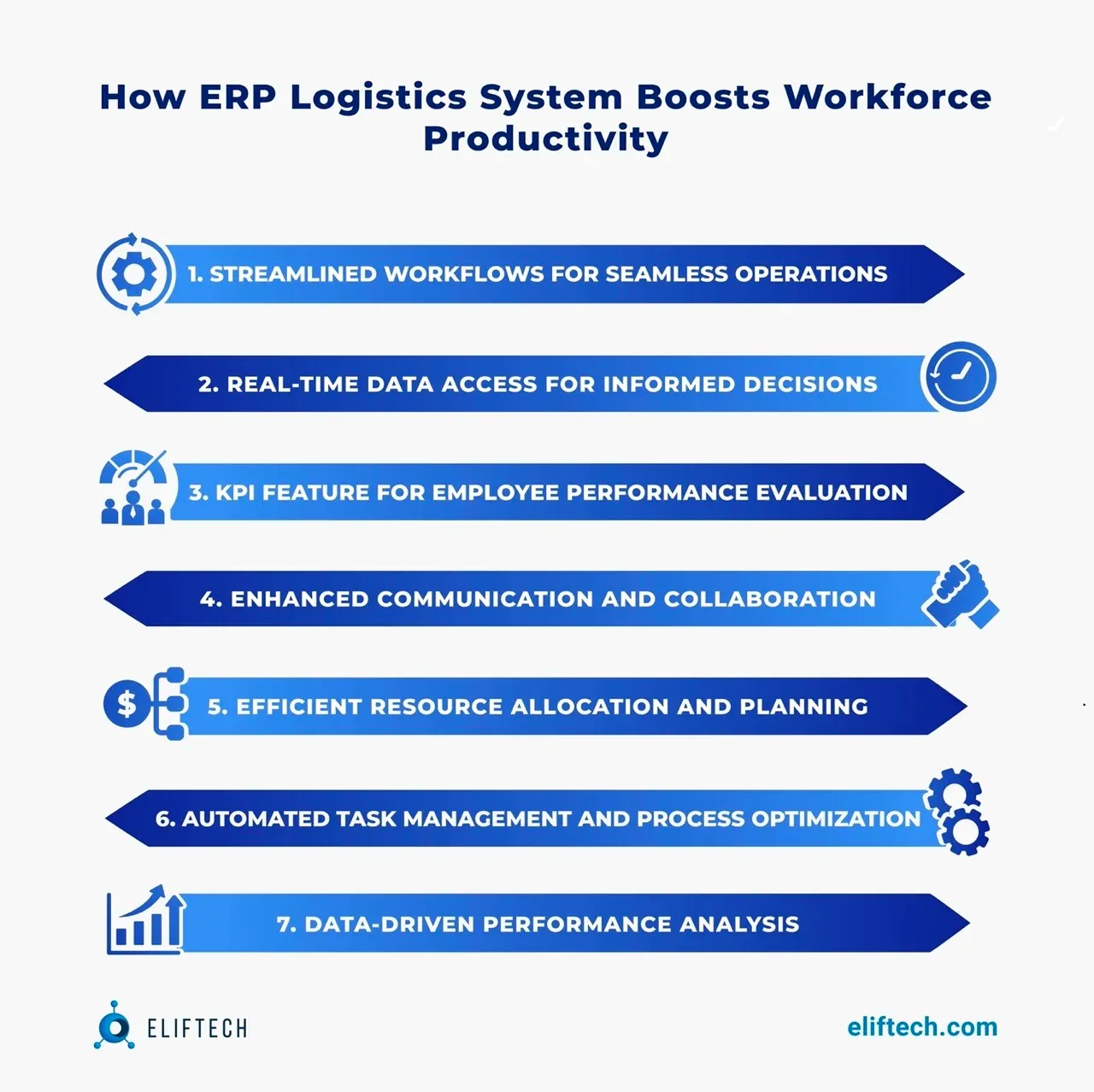Logistics
How an ERP Logistics System Can Benefit Logistics by Improving Workforce Productivity

In today's interconnected business landscape, staying competitive requires more than just streamlined operations—it demands a workforce that operates at peak efficiency. Every minute lost, every inefficiency, and every workforce productivity hiccup can cost businesses dearly.
Picture this: a team struggling with manual data entry, communication breakdowns, and inefficient resource allocation. It's a familiar pain point that keeps logistics managers up at night. That's where Enterprise Resource Planning (ERP) logistics systems step in, armed with a variety of tools and strategies to upgrade logistics management. It brings together all company data into one unified platform, boosting office productivity, refining resource management, and strengthening financial control.
In this post, we're about to show you how an ERP logistics system can be the answer to your workforce productivity challenges, ensuring that every minute, every resource, and every effort is optimized for maximum efficiency and profitability.
Work Smarter, Not Harder: The Impact of ERP Logistics System on Workforce Productivity
Before we dive into the ways ERP systems enhance workforce productivity, it's essential to establish a clear understanding of what ERP logistics software entails in broad strokes. In the context of logistics, ERP logistics software serves as a centralized hub for managing and optimizing all aspects of the supply chain and distribution network. It encompasses functions like inventory management, order processing, shipment tracking, warehouse management, and even financial management. This all-in-one system brings together data from different departments and processes, offering a unified view of operations.
The Enterprise Resource Planning (ERP) system is a comprehensive software solution designed to streamline and integrate various business processes within an organization. It acts as a centralized hub that enables different departments to work together seamlessly by providing a unified platform for data storage, management, and analysis.

Projected to reach $78.4 billion in earnings by 2026 (a jump from $38.8 billion in 2018), the worldwide ERP market is surging. This growth is fueled by the rising demand for smoother operations and clearer business processes, the growing adoption of cloud and mobile apps, and a strong desire for decisions based on data.
In the context of the logistics business, ERP systems play a leading role in optimizing operations and improving workforce management.
Remote work empowerment. ERP logistics systems enable access to vital data and tools from anywhere, ensuring seamless connectivity and productivity. Real-time updates on shipments, inventory, and orders eliminate poor office communication and reduce errors from outdated data.
What’s more, logistics ERP software works as a unified digital platform allowing remote workers to manage their tasks, track progress, and maintain instant communication with colleagues and supervisors. It fosters a more flexible and accommodating work environment, which means higher job satisfaction and better corporate culture within a logistic company.
Enhanced employee engagement and satisfaction: ERP offers robust platforms for seamless collaboration, real-time information sharing, and personalized dashboards tailored to individual roles. These tools help employees remain consistently informed about the latest updates, changes, and developments. It has to do with an ongoing process of revamping the processing software for the admin site where the order information and customer details are stored.
The transparency and accessibility of ERP systems create an environment where employees feel valued, empowered, and part of a larger collaborative effort. This translates into improved performance, increased efficiency, and a more positive and productive work atmosphere overall.
Scalability for growing workforce needs: Investing in an ERP system empowers logistics companies to effortlessly integrate new team members, harness their capabilities, and adeptly manage heightened workloads. What’s more, they streamline onboarding by equipping new team members with essential tools for efficient workflow integration.
This scalability not only addresses logistical growth challenges but also amplifies the organization's capacity to innovate, compete, and consistently provide quality services to its clientele.
ElifTech can help you maximize automation in workforce management, and reach operational excellence through custom ERP solutions. Let’s start our journey with a free consultation.
7 Ways an ERP Logistics System Boosts Workforce Productivity

Streamlined Workflows for Seamless Operations
An ERP logistics system is a key player in creating seamless workflows. Through the automation of processes like order processing, inventory management, and shipping, these systems remove manual tasks and unnecessary steps. This automation ensures that tasks move smoothly from one stage to another, minimizing delays and reducing the risk of errors. Employees can focus on high-value activities instead of being bogged down by repetitive tasks.
For instance, when a customer places an order, an ERP system can automatically generate a picking list that outlines the items to be collected from the warehouse. This list can be organized based on the most efficient route through the warehouse, minimizing unnecessary movement and optimizing the picking process.
As employees pick items, they can use handheld devices connected to the ERP system to update inventory levels in real time. This information is instantly reflected across the system so it prevents stock discrepancies and improves accuracy.
Real-Time Data Access for Informed Decisions
ERP systems grant employees immediate access to real-time data regarding inventory levels, order statuses, and shipment tracking. This instant access empowers teams to make well-informed decisions on the spot, thereby slashing response times for addressing customer queries and supply chain hitches.
For example, if a customer asks about the status of their order, an employee can quickly retrieve the information and provide an accurate update. Another example is when a shipment faces delays due to unforeseen weather conditions. With an ERP system, logistic teams can access real-time tracking data and assess the impact of the delay on delivery schedules. Armed with this information, they can proactively notify customers about the delay, manage expectations, and even reroute shipments if necessary.
Real-time data access ensures that decisions are based on the most current information available. From the examples above, there is no doubt that real-time data can minimize disruptions and enhance customer satisfaction.
KPI Feature for Employee Performance Evaluation
Many logistic companies look for ways to measure the efficiency of their order processing team. With an ERP system in logistics, managers can establish key performance indicators (KPIs) needed to generate performance reports for each team member. These reports allow logistic managers to identify areas where individual performance aligns with or veers from the designated KPIs.
For example, a logistics manager wants to assess the efficiency of the order processing team. Using an ERP system, the manager can set KPIs such as average order processing time and accuracy rate. As orders are processed, the system captures relevant data and generates performance reports for each team member. This data-driven approach allows for targeted coaching and training to improve performance where needed, leading to a more productive workforce.
Enhanced Communication and Collaboration
ERP systems enhance communication and collaboration by providing a centralized platform for sharing information and updates. With all relevant data accessible in one place, teams minimize the chances of miscommunication and duplicated efforts.
For example, suppose a logistics company is coordinating a complex international shipment involving multiple carriers, customs clearance, and delivery points. An ERP system serves as a centralized hub where all stakeholders can access shipment details, documents, and updates. This ensures that customs agents, carriers, and warehouse staff have consistent and accurate information, preventing misunderstandings and delays. Communication is streamlined, and collaboration among various parties is facilitated, leading to smoother operations and timely deliveries.
Efficient Resource Allocation and Planning
ERP systems provide a holistic view of resource availability, workload distribution, and employee skills. With this information, managers can allocate tasks based on employee expertise, availability, and workload capacity. Managers can assign tasks to employees who have the necessary skills and are not already overloaded. This leads to optimized resource utilization and prevents overburdening specific individuals.
Additionally, ERP systems enable effective planning by providing insights into peak demand periods. It helps businesses minimize bottlenecks and prevents overburdening specific teams, leading to improved productivity during peak periods.
For example, a logistics company experiences a surge in order volume during a seasonal peak. An ERP for a distribution system can forecast demand and allocate tasks accordingly by analyzing historical data and current trends. Employees with expertise in handling high volumes can be assigned to critical areas, ensuring that orders are processed efficiently without compromising quality.
Automated Task Management and Process Optimization
ERP software for the logistics industry automates routine tasks and processes, reducing manual intervention and minimizing the chances of errors. This automation extends beyond logistics operations, allowing businesses to create CI/CD solutions and automate processes and monitoring tools across various departments.
As a result, employees can allocate their energy toward tasks that demand critical thinking and decision-making, rather than doing repetitive administrative tasks. This automation doesn't just save time; it also promotes standardized processes, reducing task variability and fostering consistent quality across all operations.
For example, a logistics company receives a high volume of similar orders from different customers. An ERP in logistics and supply chain management canc automate order processing by recognizing patterns and generating order templates. This automation reduces the need for manual data entry and speeds up order processing. Additionally, the system can automatically generate packing lists, shipping labels, and customs documentation to streamline the shipping process.
Data-Driven Performance Analysis
ERP systems enable data-driven performance analysis by generating comprehensive reports and analytics. This information enables evidence-based decision-making, allowing management to address challenges and implement targeted improvements.
Data-driven insights help optimize business processes, adjust resource allocation, and implement strategies to enhance overall workforce productivity. It stimulates the company’s workforce to continually evolve to meet changing demands and drive better business outcomes.
For instance, your logistics enterprise strives to enhance delivery times, so an ERP system can provide insights into driver performance. By analyzing data on delivery routes, average delivery times, and delays, managers can identify areas where drivers encounter bottlenecks. By dissecting data concerning delivery routes, average delivery times, and delays, managers can recognize points where drivers encounter bottlenecks.
How Custom ERP Systems Solve Logistic Challenges
Logistics can be complex, and standard solutions might not solve specific business challenges. That's where custom ERP solutions come in.
Custom ERP solutions allow businesses to mold technology to their needs, not the other way around. Off-the-shelf systems often require companies to adjust their processes to fit the system's capabilities, which can lead to inefficiencies and frustration. On the contrary, custom ERP software development starts with an in-depth analysis of the company's operations, pain points, and growth aspirations.
The logistics sector faces a diversity of challenges, from managing complex supply chains to optimizing route planning for efficient deliveries. A custom solution can empower the workforce to navigate these challenges with precision.
Custom ERP system logistics development holds the key to overcoming specific challenges in the logistics sector. At ElifTech, we specialize in crafting custom ERP systems that provide concrete solutions to these challenges, enhancing workforce productivity and streamlining operations:
- Identifying Unique Business Requirements: Custom ERP solutions begin by comprehensively understanding the company’s distinct needs and workflows. Our approach begins by closely collaborating with the company’s representatives to understand their distinctive needs. By aligning the system with specific business requirements, we empower companies to tackle their operational intricacies head-on.
- Designing a Custom-built ERP Logistics System: Off-the-shelf solutions often fall short when it comes to handling the complexity of logistics operations. In response, we design an ERP for logistics that seamlessly integrates with existing workflows.
- Seamless Integration and Training: Implementing an ERP system is a critical endeavor that necessitates the smooth integration of new technology with existing tools and processes. Custom solutions are purpose-built to seamlessly blend with current systems, minimizing disruptions. Most custom ERP providers (ElifTech included) offer personalized training sessions and documentation for the company's team, ensuring a smooth transition and effective system utilization.
- Enhanced Reporting and Analytics: Custom ERP systems by ElifTech offer insightful reporting and analytics functionalities. These modules generate performance reports, allowing managers to assess productivity levels, identify bottlenecks, and make informed decisions to enhance workforce efficiency.
- Real-time Tracking and Visibility: ElifTech's custom ERP solutions provide real-time tracking and visibility features for shipments, orders, and inventory. This real-time monitoring enables logistics companies to promptly address issues or delays, leading to smoother operations and improved workforce productivity.
- Demand Forecasting and Resource Allocation: Integrated demand forecasting modules in ElifTech's custom ERP systems help predict customer demand accurately. This ensures optimized resource allocation, aligning the right amount of workforce, vehicles, and resources to efficiently meet fluctuating demand levels.
- Mobile Accessibility and Remote Management: Our custom ERP systems incorporate mobile accessibility, allowing managers and employees to access critical information and manage tasks remotely. This empowers field staff, drivers, and remote employees to make informed decisions on the go, enhancing overall workforce productivity.
- Task Prioritization and Workflow Optimization: ElifTech's custom ERP systems include features that prioritize tasks based on urgency and importance. By automating task prioritization, logistics companies can optimize workflows eliminating low delivery speed & long development time. We make sure high-priority tasks are handled promptly, reducing delays and improving overall operational efficiency.
- Quality Control and Compliance: For logistics companies dealing with sensitive or regulated goods, our custom logistics ERP systems can incorporate quality control and compliance modules. These modules monitor adherence to industry regulations and quality standards, preventing errors and ensuring that workforce activities comply with requirements.
An ERP system is no longer a tool just for automating day-to-day logistics operations. They're transformational assets that supercharge workforce productivity. With software logistics ERP solutions, your logistics business can conquer workforce challenges related to productivity, management, and overall performance.
ElifTech helps businesses achieve smooth team management with custom solutions—whether cloud based ERP software or logistics web based erp software. Let us know about your next project and we'll help you improve your team's performance indicators.
